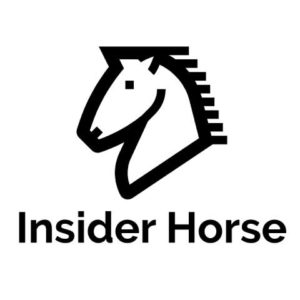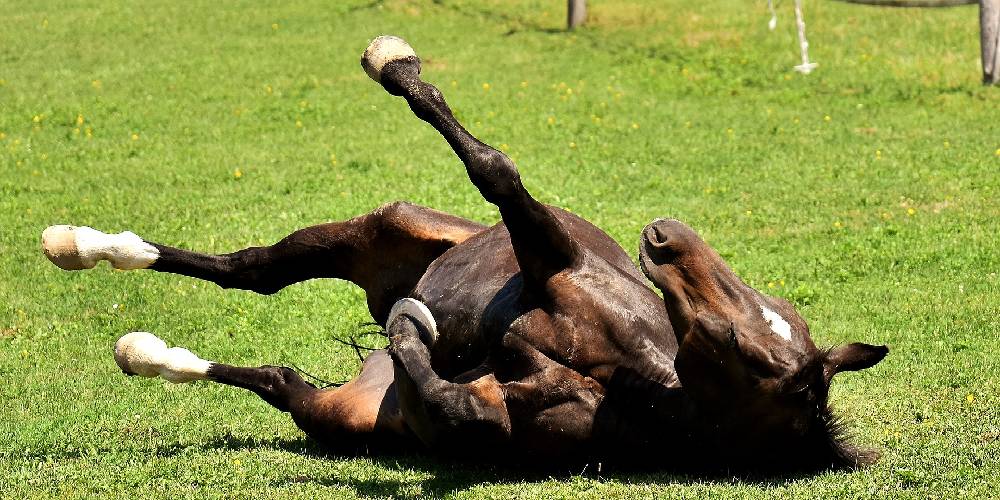Horses are not able to vomit, they suffer from something called colic instead. People, including equestrians and people in the horse industry, are often curious about why horses are unable to puke and why they colic instead. I wanted to share what I know on the topic to help answer questions that some of my readers might have.
Can Horses Vomit?
The answer is no, they cannot. Horses are unable to vomit so when they have an upset stomach for any reason, they colic. Colic is essentially stomach pain that the horse reacts to by excessive rolling, kicking at their belly, lying down, not eating or drinking and other similar symptoms. Horses can’t vomit because they have lower esophageal sphincters that allow the esophagus to be a one-way track, letting food down but not letting anything come back up.
Why Can’t Horses Vomit?
Horses have a very unique digestive system that is different than many animals on the planet. When horses eat, they swallow just like any animal would do, but their esophagus only works one way, and that’s to go down into the stomach. The lower esophageal sphincters on the end of the esophagus leading into the stomach cause it to be a one-way track, so no food or liquids can come back up the esophagus.
Humans and other mammals have lower esophageal sphincters as well, but they work differently than those of horses. Most other mammals have sphincters that allow food to pass back through the esophagus and out of the body as a protection mechanism.
Puking is a protection mechanism to rid the body of something in the stomach that could be potentially harmful. Unfortunately, horses don’t have this mechanism and suffer through the pain of whatever is causing the colic whether it is a poisonous plant, bloating, or sand.
Colic Symptoms
There are several symptoms of colic to keep an eye out for. Every horse may react differently to colic, but overall the symptoms of colic are the same.
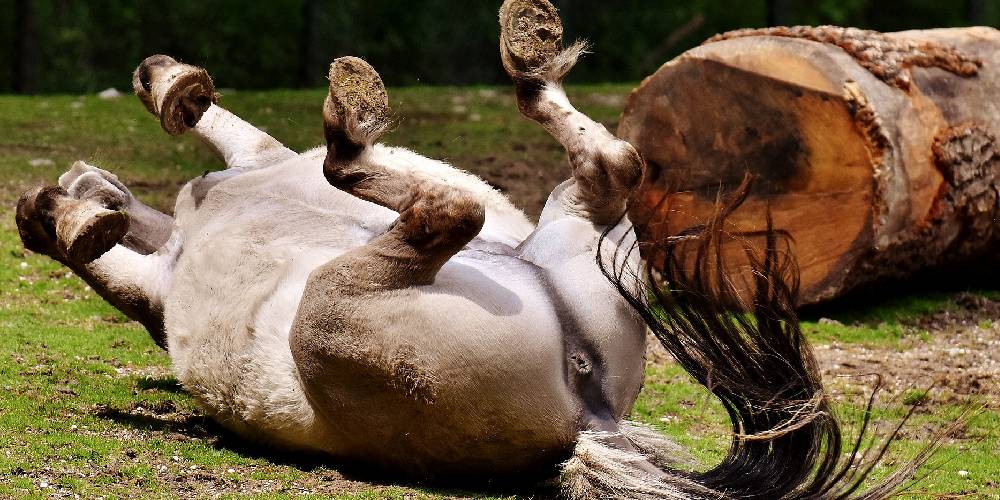
The symptoms include:
- kicking at the belly
- looking at the belly
- biting their sides
- excessive rolling
- sweating
- shock
- lying down for a long period of time (I discuss this further in my article “Can Horses Lay Down?“)
- not drinking
- not eating
- third eyelid flashing
- ears turned back
- fever
- lack of gut/digestive noises
- increased heart rate
- low hanging head
- dull expression
What Causes Colic?
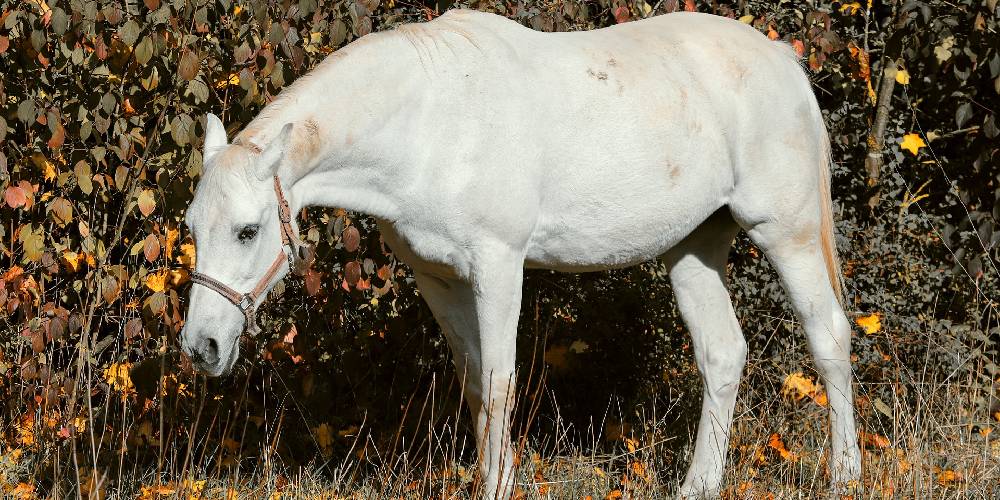
Colic is caused by a number of things that all point back to very similar symptoms. There are gas colic and sand colic, and the possibility of a twisted gut caused by colic, and more. Colic is not an actual sickness, it is more of a reaction to something. An example would be a dog vomiting after they eat too much food, but a horse would just colic instead.
So what are the causes and descriptions of different forms of colic?
Sand Colic
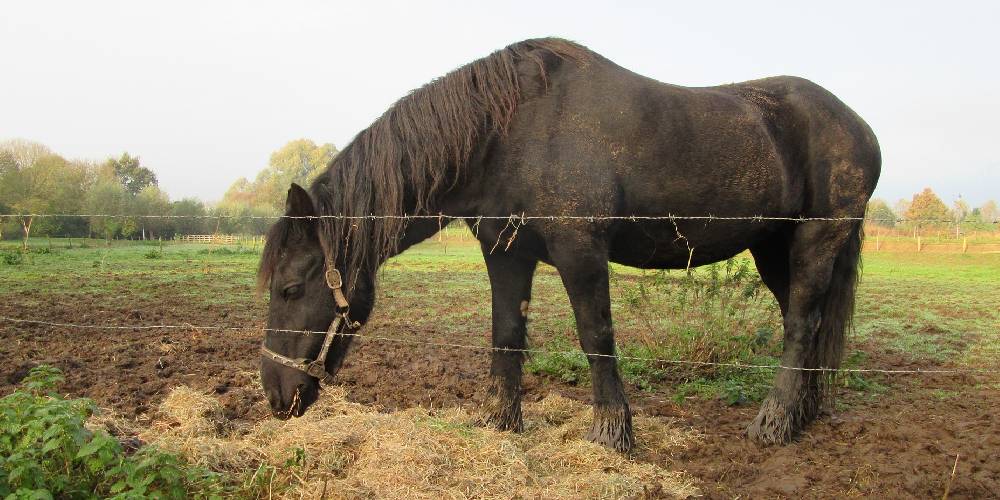
What Is It?
Sand colic is caused by the horse ingesting sand when they’re eating. Because the horse can’t digest the sand, it can build up in their stomachs. When there gets to be too much sand in the stomach and intestines, the horse will begin to show symptoms of colic.
How To Prevent It:
Sand colic can be prevented by doing a number of things. Horses who live in a sandy area or a place with loose dirt should be fed their hay in feeders or on mats, not directly on the ground. Once a month, horses can be fed a sand-rid supplement called psyllium which helps to clear their gut of sand and dirt.
Some horses, like a Quarter Horse I ride named Olivia, will eat dirt. To prevent this, keep the horse in a bedded stall rather than in a dirt one. If that is not possible, keep psyllium in their diet to reduce the sand buildup in their gut. This will significantly reduce the risk of sand colic.
Gas Colic
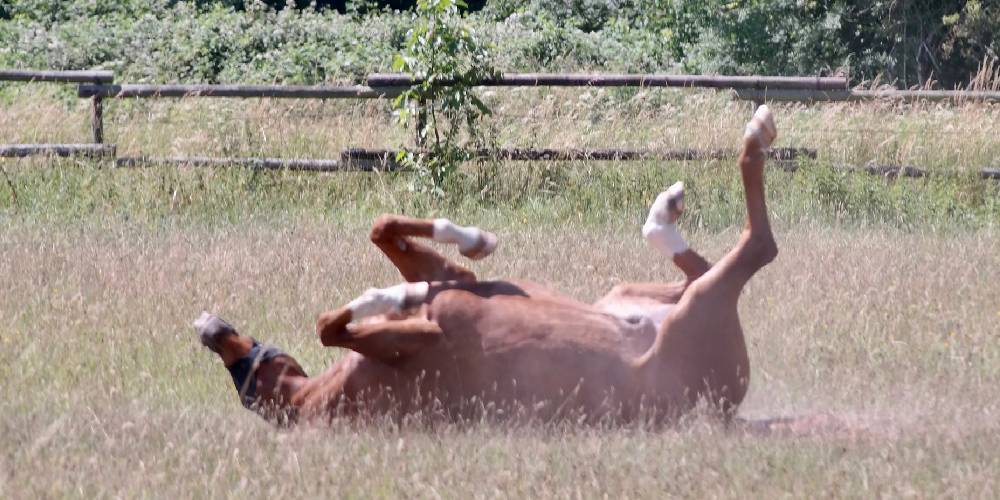
What Is It?
Gas colic refers to any form of colic involving bloating or gas in the stomach and intestines. This is one of the most common types of colic seen in horses. It can be caused by eating too much grain or hay, ulcers, dehydration, lack of exercise, changing food without slowly introducing it to the horse’s diet, and more.
How To Prevent it:
Gas colic can be prevented in many different ways. If you are switching your horse to a new feeding schedule, new supplement, or anything involving an alteration to your horse’s food, it should be introduced slowly. Rapidly changing foods is not good for the horse and isn’t recommended.
Feeding a horse too much is never a good thing. Horses that eat too much cause way more gas to be produced than a normal horse. This is because the stomach acid is breaking down more food in one sitting than it normally would producing an excessive amount of gas. To keep this from happening, feed your horse little by little throughout the whole day to keep a balanced flow of food moving through the body.
Horses should be hydrated and exercised frequently. Without water and exercise, the horse not only is at risk for colic but is also at risk for overall deterioration. Making sure your horse is adequately exercised and always has clean water nearby is essential for their health. If a horse is dehydrated it could become compacted and are not able to defecate causing bloat.
A Twisted Gut
What Is It?
A twisted gut occurs usually when a horse has been suffering with colic for an extended period of time. Typically a gut twist is found in a gas colic situation where the intestines ballooned outward and twisted or got kinked. in many occasions, the horse needs surgery to be saved.
How to Prevent It
Twisted guts can be prevented by keeping your horse fed throughout the day so there is always food in their system. This is more natural for the horse and reduces the chances of a gut twist significantly.
If your horse is already suffering from colic, do NOT let them roll. This will greatly increase the chances of part of their intestines twisting.
Colic Caused by Consuming Poisonous Plants

What Is It?
Colic caused by the consumption of poisonous plants is very hard to deal with. Because horses are unable to puke up the poison, their bodies must digest and absorb the plant making it a very painful and potentially deadly process. This colic is caused by the body’s reaction to the poisonous plant that the horse ate.
How To Prevent It
Learning what plants are poisonous to horses and removing them from any and all turnouts and pastures can help to keep you horse safe.
My Experience With Colic
My first horse, a palomino Missouri Fox-Trotter, was named Show-Me. I had been riding her for almost four years before her owners gave her to me. After just owning her for three months, I got a call from the barn owner that my horse was suffering from colic.
I arrived at the barn, and indeed she had colic. We called out a veterinarian who administered the routine colic care of tubing the horse and using mineral oil to help compaction (basically horsey constipation) pass if that what causing the colic.
After waiting several hours, things were not improving. There were no gut noises and when looking at her gums, they were extremely pale with just red by her teeth which is an indicator of shock.
Show-Me suffered from colic from before five in the morning to around eight at night.
We called out a second veterinarian who did a rectal palpation and found a baseball sized mass in her intestines, and multiple twists in her gut.
It was at this point where I knew it was time to let her go. I helped the vet lie her down in the arena after giving her a pain killer and a sedation drug. When she was lying on the ground the vet put her down. I was stroking her ears when I felt her pass away in my arms.
When talking to the vet afterwards, she said that a fatty thread attached to the tumor had wrapped itself around her intestine cutting off blood flow, gas flow, and the entire digestive tract. The fact that gas couldn’t pas through her intestines caused her intestines to balloon outward in several places pushing them into places they shouldn’t be ans getting them twisted around everywhere.
Colic is never pretty, and it is always heartbreaking when something like that takes the animal you love away from you.
Thankfully, there is more successful recovery stories than tragedies that I faced.
